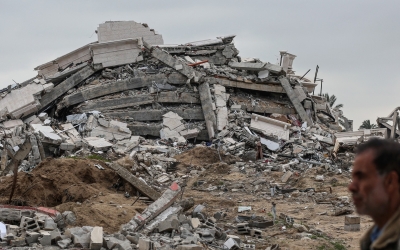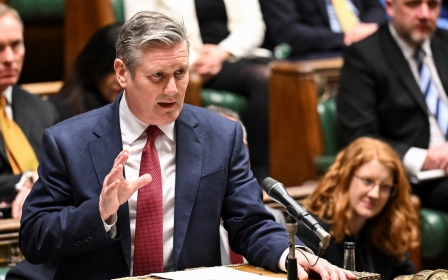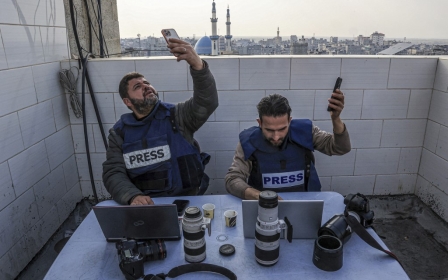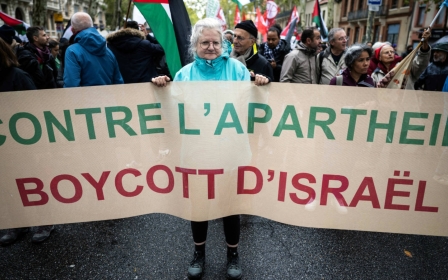Gaza: Ceasefire campaigners accuse politicians of stoking 'social panic' over protests
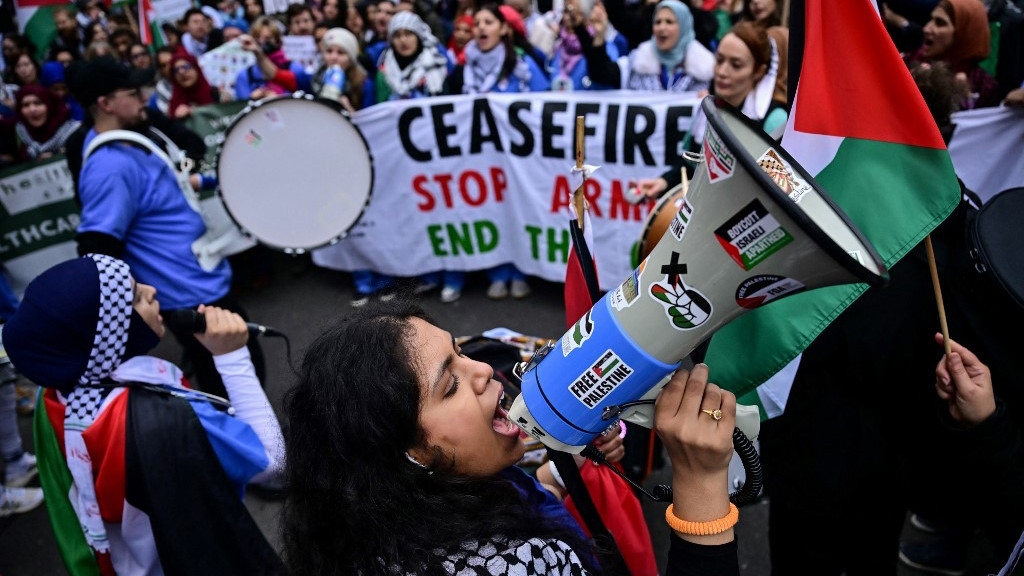
Pro-Palestine groups in the UK have accused British politicians of “creating a smokescreen” to deflect attention from calls for a ceasefire in Gaza, amid pressure from the police to curb protests in central London.
The coalition of groups, which regularly organises protests to demand a ceasefire in Gaza, told journalists on Wednesday that “divisive rhetoric” by British MPs and “selective media coverage” is driving calls to curb protest rights in Britain.
“A social panic is being generated by a government who are avoiding the idea of demanding a ceasefire in Gaza,” said Chris Nineham from the Stop the War Coalition.
“These divisive comments are creating the very tensions that politicians want to avoid, because the reality is that the protests are incredibly diverse.
"They involve huge chunks of society; not just members of the Jewish community, but sections of the whole society.”
New MEE newsletter: Jerusalem Dispatch
Sign up to get the latest insights and analysis on Israel-Palestine, alongside Turkey Unpacked and other MEE newsletters
Since the 7 October Hamas attacks in southern Israel and the start of Israel's bombing campaign and ground offensive in Gaza, protests calling for a ceasefire have taken place on a fortnightly basis in central London, regularly drawing crowds estimated to be in the hundreds of thousands.
The continuing assault on the enclave by Israeli forces has killed at least 30,000 Palestinians, according to health officials in Gaza.
Complaints sent to London police
The groups organising the protests include Friends of Al Aqsa, the Muslim Association of Britain, the Palestine Solidarity Campaign, the Palestinian Forum in Britain and the Stop the War Coalition.
Last week, British Prime Minister Rishi Sunak accused protest groups of intimidating MPs during a debate in parliament over a ceasefire in Gaza. Pictures posted online showed hundreds of people waiting outside the Houses of Parliament to lobby their MPs to support a ceasefire.
'When we get people involved in our campaigns to call for a ceasefire, we are bringing them close to democracy, to having their say'
– Shamiul Joarder, Friends of Al Aqsa
Shamiul Joarder from the Friends of Al Aqsa group helped organise the lobby of parliament last week.
"When we get people involved in our campaigns to call for a ceasefire, we are bringing them close to democracy, to having their say," said Joarder.
"Ultimately, it comes back down to the fundamental call that we all have: to stop the bombs dropping. To end the suffering. To call for a ceasefire. That's why we will continue our protests and our campaigns."
The coalition of groups also told journalists that it had submitted two dossiers and one letter to London's Metropolitan Police, giving examples of "restrictive, politicised, heavy-handed and violent policing during demonstrations".
Among the key complaints voiced against the police by the protest groups include aggressive and violent arrests of protesters.
Protest groups raised concerns over reports by Middle East Eye that the Community Security Trust was present in the control rooms during previous Palestine protests.
They also accused the Metropolitan Police of using X, formerly known as Twitter, to "demonise demonstrators, using language that implies they are threatening or dangerous when they are in fact overwhelmingly peaceful and disciplined".
Wednesday’s press conference in parliament coincides with reports that Home Secretary James Cleverly is looking at tightening the law around protests, heeding calls by the Home Affairs Select Committee to demand protest groups give more notice for large demonstrations - from six days to two weeks.
In a report published on Tuesday, the Home Affairs Select Committee said the size and frequency of the protests in London was causing unsustainable strain on policing resources, and recommended that Cleverly should look at extending the notice period organisers were required to give police when planning a protest.
But it said that in policing the protests the police had generally maintained the balance between the right of protest and the right of people to go about their daily lives. It said the protests had tested the "operational independence" of the police, but concluded that this too had been maintained.
The report was criticised by the Campaign Against Antisemitism (CAA), which in its evidence to the committee had characterised the protests as intimidating to many Jewish people, and called for the police to impose further restrictions and make more arrests.
In a comment on X, CAA said: "After months of intimidatory marches, this report offers no concrete recommendations for the here and now... The Jewish community is in fear and our city centres remain no-go zones during the protests. We need action urgently."
In an interview with The Times on Wednesday, Cleverly said: "I think the organisers should recognise that they’ve made their point, they’ve made it loudly and they’re not adding to it by repeating themselves.”
The next protest in central London is scheduled to take place on 9 March.
Middle East Eye delivers independent and unrivalled coverage and analysis of the Middle East, North Africa and beyond. To learn more about republishing this content and the associated fees, please fill out this form. More about MEE can be found here.


